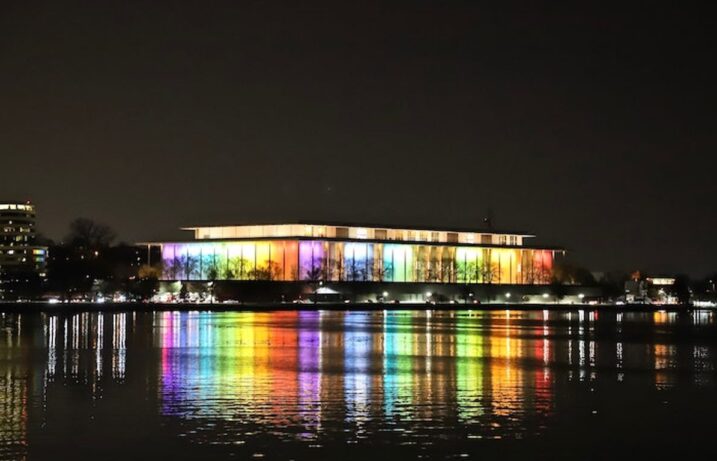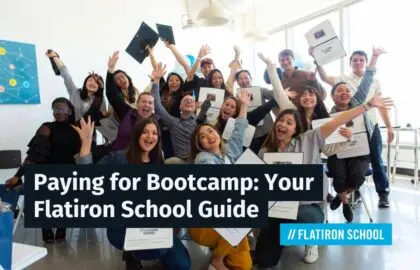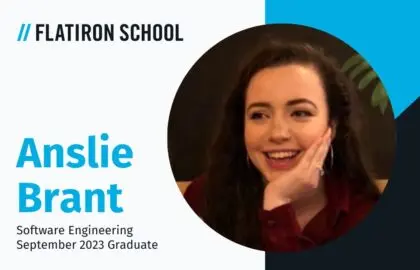Max G. is grateful to be a member of the tech community after graduating from our immersive Software Engineering program at our Washington, D.C. campus. For Max, going to Flatiron School was a way to change his life.
Becoming a software engineer would help him gain stability and help him help others in the LGBTQ+ community. Throughout his journey, Max has been a champion for inclusion. Today, he continues that mission as a software developer in Baltimore.

Before enrolling in our program, Max experienced homelessness. As he continued to transition, Max’s relationship with his family deteriorated. “After having an uncomfortable conversation with my father, I fled to New York City where I lived in a series of church basements,” he says. “I later traveled around the country trying to find affordable housing that was open to the trans community.”
He first heard about Flatiron School during this time, but didn’t have the resources to attend. He figured that if, down the road, Flatiron School was around and he was around, he would apply. Fortunately, his situation improved with the newfound support of his biological family in Baltimore. It just so happened that we launched our nearby campus in Washington, D.C.,during that time.
“I chose Flatiron School because of the culture of inclusivity and diversity,” he says. He completed the Coding Bootcamp Prep and was ready to learn the skills he needed to become a software engineer.
Our welcoming community and test-driven curriculum let him focus on learning. “The Flatiron School community is a great learning community that never stops trying to improve itself and tries to be accessible to anyone who has the desire to get into coding,” he says. It was fine to be wrong and there was always someone around who encouraged him to try again. “Learning to code has helped me become a more complete person.”
Even when there was an incident where something inappropriate was said, Max said we addressed the situation quickly and appropriately.
It was also during this time that Max reconciled with his family. While the circumstance that helped repair the relationship was unfortunate, he’s grateful to have the support of his family. He also had a permanent place to stay, courtesy of WeLive, where Max could focus on studying.
After graduating from Flatiron School, Max continued to be an active member of both the tech and LGBTQ+ communities. He’s an active member of both StartOut — a nonprofit organization that helps LGBTQ+ entrepreneurs and Out in Tech — a not-for-profit organization that develops growth opportunities for LGBTQ+ members in the tech community. Max also serves as a mentor to LGBTQ+ individuals who want to start their own careers in tech.
Max is now a developer at SmartLogic in Baltimore. While he may pass as a “tech bro,” in his words, that’s not his background. “I was programmed, growing up as a girl, with all these safety precautions,” he says. “Things like where to go and to not stay out late. I don’t think a lot of men are raised that way.”
He’s part of a great team and receives benefits like health insurance and free company lunches. But, he doesn’t forget his journey and uses his experience to more sure his company, and Baltimore’s tech community, is more inclusive.
Sometimes, that’s through discussions about gender norms or reminders to be grateful about a perk like free lunch. Sure, you may have tried all the local restaurants, but there are many people who wish they could be in your position.
“There are basic things I remember not having before this job. Things like healthcare, a new computer that goes with the job,” he says. “For me, it’s an ‘Oprah’ moment. But, other colleagues may take it for granted.”
He believes that being a changemaker could be relatively small or relatively large. You just never know the impact your actions or words may have. Additionally, he says being a changemaker is being a part of a larger community who wants to make a change.
For LGBTQ+ individuals who want to start a career in tech, Max says to not be discouraged by negative experiences. “There’s a place for you in tech. There will be people who say yes to who you are in tech,” he says. For people who want to make tech more inclusive, he says to be mindful and try to remember that not everyone comes from the same background. Take the time to empathize with others and be receptive to feedback.




